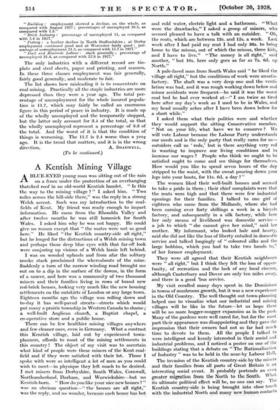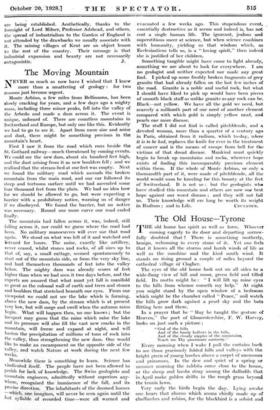A Kentish Mining Village
ABLUE-EYED young man was sitting out of the rain on a fence under the protection of an overhanging thatched roof in an old-world Kentish hamlet. " Is this the way to the mining village ? " I asked him. " Two miles across the hill-side there," was the reply in a strong Welsh accent. Such was my introduction to the coal- fields of Kent. My friend was ready enough to impart information. He came from the Rhondda Valley and after twelve months he was still homesick for South Wales. I asked him why he was not happy. He could give no reason except that " the mates were not so good here." He liked " the Kentish country-side all right," but he longed for the distractions of a Welsh mining town and perhaps those deep blue eyes with that far-off look were conjuring up visions of a Welsh lassie left behind.
I was on wooded uplands and from afar the solitary smoke stack proclaimed the whereabouts of the mine. Suddenly a turn of the narrow winding road brought me out on to a dip in the surface of the downs, in the form of a saucer, and here was a community of two thousand miners and their families living in rows of brand new red-brick houses, looking very much like the new housing settlements on the outskirts of London or any large town. Eighteen months ago the village was rolling down and to-day it has well-paved streets—streets which would put many a prairie township in Western Canada to shame ; a well-built Anglican church, a Baptist chapel, a co-operative store and a public house.
There can be few healthier mining villages anywhere and few cleaner ones, even in Germany. What a contrast this Kentish village, laid out by experienced town- planners, affords to most of the mining settlements in this country ! The object of my visit was to ascertain what kind of people were these miners of the Kent coal- field and if they were satisfied with their lot. Those I spoke with were as intelligent a lot of men as you could wish to meet—in physique they left much to be desired. I met miners from Derbyshire, South Wales, Cornwall, Northumberland, Durham, and Warwickshire--but no Kentish-born. " How do you like your nice new houses ? " was an obvious question—" the houses are all right," was the reply, and no wonder, because each house has hot and cold water, electric light and a bathroom. " What were the drawbacks," I asked a group of miners, who seemed pleased to. have a talk with an. outsider.. " Oh, the rents, which are between 13s. and 15s. a week. Last week after I had paid my rent I had only 36s. to bring home to the missus, out of which the missus, three kids, and I have to live." "The money is all right," said another, " but 10s. here only goes as far as 7s. 6d. up North."
A pale-faced man from South Wales said " he liked the village all right," but the conditions of work were unsatis- factory. The shaft was a very deep one and the venti- lation was bad, and it was rough working down below and minor accidents were frequent—he said it was the worst coal bed he had ever worked at—" I am twice as tired here after my day's work as I used to be in Wales, and my head usually aches after I have been down below for a short while."
I asked them what their politics were and whether they would support the sitting Conservative member.
" Not on your life, what have we to conserve ? We will vote Labour because the Labour Party understands our needs and is the only party that really cares for us— outsiders call us ' reds,' but is there anything very red in wanting to improve our living conditions and to increase our wages ? People who think we ought to be satisfied ought to come and see things for themselves. How would you like to spend seven hours of the day stripped to the waist, with the sweat pouring down your legs into your boots, for 11s. 6d. a day ? "
• The women liked their well-built houses and seemed to take a pride in them ; their chief complaints were that the rents were high and that there were few industrial openings for their families. I talked to one girl of eighteen who came from the Midlands, where she had been earning over forty shillings a week in a bicycle factory, and subsequently in a silk factory, while here her only means of livelihood was domestic service— a job to which " she cannot give her mind," said her mother. My informant, who looked hale and hearty, said she did not like the loss of liberty entailed in domestic service and talked longingly of " coloured silks and the large bobbins, which you had to take two hands to,1 of her former employment.
They were all agreed that their Kentish neighbours were " all right," but I think they felt the loss of oppor- tunity, of recreation and the lack of any local cinema, although Canterbury and Dover are only ten miles away, and there is a good 'bus service.
My visit recalled many days spent in the Dominions in towns of mushroom growth, but it was a new experience in the Old Country. The well thought out town-planning helped one to visualize what our industrial and mining villages will be like in the future—let us hope there will be no more hugger-mugger expansion as in the past.
Many of the gardens were well cared for, but for the most part their appearance was disappointing and they gave the impression that their owners had not so far had much time to devote to them. All the people I talked to were intelligent and keenly interested in their social and industrial problems, and I noticed a poster on one of the buildings stating that a debate on " The Rationalization of Industry " was to be held in the near-by Labour Hall.
The invasion of the Kentish country-side by the miners and their families from all parts of Great Britain is all interesting social event. It probably portends an even greater migration from the North to the South. What its ultimate political effect will be, no one can say. The Kentish country-side is being brought into close touch with the industrial North and many new human contacts are being established.. Aesthetically, thanks to the foresight of Lord Milner, Professor Adshead, and others, the spread of industrialism to the Garden of England is not attended by the drawbacks we usually associate with it. The mining villages of Kent are an object lesson to the rest of the country. Their message is that industrial expansion and beauty are not necessarily































































 Previous page
Previous page